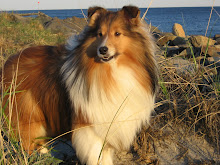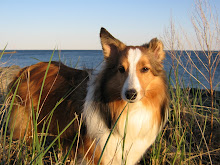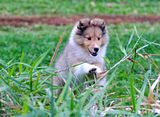This post was inspired by the "Real Life" post by one of our favorite Bloggers "Many Muddy Paws". (If you haven't read it, and it's follow up post, go check it out!)
I have long since been an advocate for people teaching their dogs real world skills. When I taught puppy and small dog beginner and advanced classes, I always tried to impress upon my students how great it is that their dogs could shake their hand, and leave a biscuit that was placed in front of them alone, but that the real importance of those lessons was to have a happy, well socialized, SAFE pet. It wasn't just "shaking hands", it was an ice breaker for someone who might be afraid of a big (or any sized) dog; it wasn't just neat how your dog could turn their noses up at a piece of highly edible food that was being offered to them, but it was an extremely important safety skill that can be used when your dog was going to eat something undesirable or worse, dangerous. (Like the time a little boy was trying to feed my girls M&M'S in Petco).
Even the "fun" things that we did in class had an important purpose: when we brought out small agility equipment for the dogs to play on at our last class, we were not only intending for everyone to just have fun. It was important to not only build the confidence of new dogs and their new owners, but to also demonstrate to the humans that if they could act like EVERYTHING they taught their dogs was this fun, then their dogs would learn things and be weaned off treats faster. They should treat every exercise as a game; sit and lie down doesn't have to be boring!
When I worked for the big facility here in Mass, I was told that using our own dogs as demos would cause the students to feel bad; it would cause a sense of inadequacy, and make them feel like they could never achieve that level of "obedience". I, however, thought and saw differently. When I did bring my girls out for demos, I found that the students really did strive to do better: concentrate more on their homework and try new things as well. Many said to me that they hoped that their dogs could be like mine. I took this opportunity to remind them that this was my JOB. They were the ones who had it really hard; they had to work their regular jobs and THEN find the time and energy to put into training their dog to be a good citizen. I got to do the training AS my job every day. I told them that I did just as much work on my two as they were doing, but I was able to incorporate this into my every day activities: because it was what I was PAID to do. I made sure that they understood that just because we were the trainers, we did not keep the "magic" pills hidden in the office for our use only. They could do whatever they wanted with their dogs but just like with anything else in life, you get what you put in.
I also tried really hard to impress upon them that they had to take into account several factors in their training and relationships with their dogs even before we got started. You should always remember that you dog is a DOG: not a human in fur-clothes. They are going to do DOGGY THINGS like eat and roll in disgusting things, sniff butts, and wrestle/play fight with other dogs. We expect a lot from our dogs because they live in our homes and play such a huge part in our lives. But they cannot be held to the same high social standards that we put on ourselves and our human children. If you can't handle NORMAL (i.e.: non aggressive, non-out of control) behaviors, then don't get a dog. HOWEVER, there are doggy behaviors that although are normal, can be considered rude and bothersome if they are allowed to continue. These include jumping on people and incessant barking. All of these behaviors can get better and get under control with some good training, but remember: they ARE normal.
The next thing that I asked them to keep in mind was their dogs breed. It is important to know something of the history of the breed (or breeds in some cases) so that certain behaviors predictability could also be kept in mind. (Shelties bark, Labs swim and retrieve, Beagles bay...) Going a bit beyond that, is to keep the dogs INDIVIDUAL personality in mind. It's important to remember that even though you have a lab, this dog may not retrieve. Your Newfie may not like water. Your Border Collie may not have "eye". And just because the LAST 15 individuals that you owned of this breed did behaviors A,B and C, doesn't mean that this one will. Just like with people, dogs genetics, socialization and personality reflects how it will behave in certain situations.
It is important to keep this all in mind so we do not place too high expectations on these little fuzzy beings so that we may enjoy a happy life with them; we don't want to waste our all too short time being angry or frustrated with them. Which is why training in itself is so important. We bring these guys into our lives for companionship and love, so why not make that a little easier to come by?
And on that note, it is so important to not only spend time training your new best friend to be a well-mannered member of society so that they can go out and about with you, but it is important to remember to cherish the time that your dog has a new member of your family. (As was posted in the "Full Tilt Border Collie's" blog where "Manny Muddy Paws got THEIR inspiration). As important as training is, don't forget that this is just the start of your magical journey together. Although every moment is precious and deserves to be remembered, it is the first golden days that you spend together that will be most missed once they have gone. Once our dogs grow into adults and their training is "complete", you start to remember and revel in the beautiful puppy nostalgia; remembering the silly puppy behaviors that although at the time probably seemed annoying, are now looked back on fondly. It was those behaviors that were the dogs raw personality coming through-without the training and discipline that we ingrain in them as they grow up. These puppy antics may have even helped get them their name (sometimes that name that you spent so long deciding on would have changed the instant you met and got to know them because their true nature shone through).
I'm not really sure what the point of this blog was; so many of you reading this know and are aware of all of this already. I guess that, just like with any of the other blog posts I write, this is a little bit for myself as well as for everyone else. I constantly try to remind myself to be thankful for every day I get to spend with my girls...and I hope that in my efforts to remind myself, that maybe I remind someone else as well. I try to remember that even though we aren't competing in Agility anymore, all those wonderful hikes in the woods and trips out and about are just as special as any clean run. And although that just the thought of it is excruciating to think about, I hope that one day, when my girls have crossed over that Rainbow Bridge, I will look back on all of these posts and remember that I did love them every day that we shared together. And that just because they will have gone, doesn't mean that the love that I have needs to go too. That is what will get me through those toughest of days. And that is what gets me through these tough days too.
Monday, April 20, 2009
Subscribe to:
Post Comments (Atom)










































Good thoughts, even for those of us whose Shelties are no longer puppies. Like me.
ReplyDelete